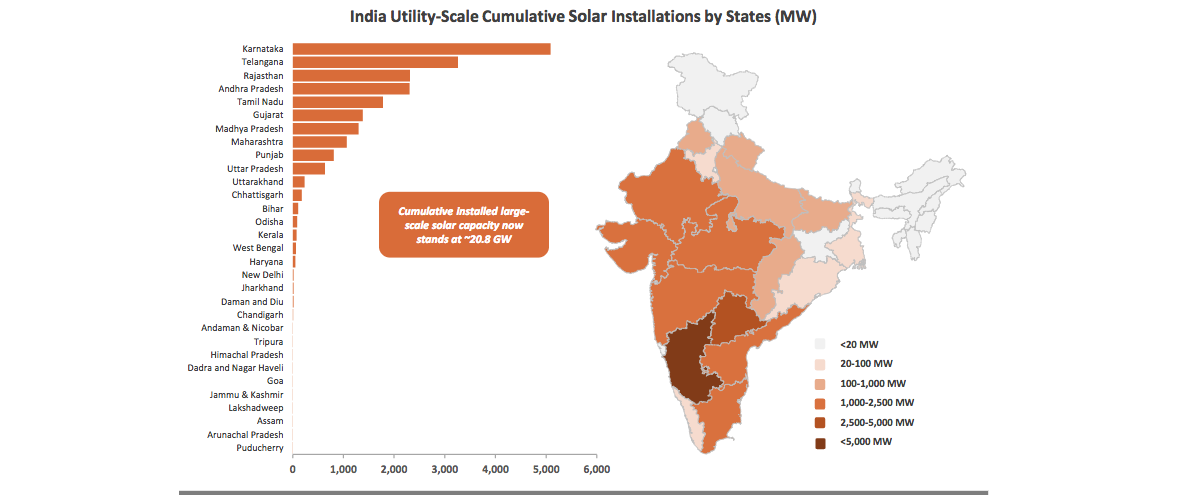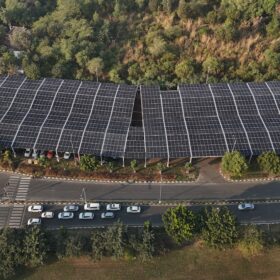The economic case for renewable energy power purchase agreements (PPAs) in India is now sufficiently compelling for companies to consider renewable power procurement options and negotiate contracts on a state-by-state basis — according to a new report released by the World Business Council for Sustainable Development (WBCSD).
For a favorable location in India, a customer should be able to realize a 20-30% discount on grid power tariffs. Companies understand the benefits, for instance Godrej Industries Limited and its associate businesses are looking to save INR50 million ($738,000) per year with open access PPAs.
A significant bulk of India’s power generation capacity is yet to be built and a large chunk of new electricity demand is expected to come from business. Industrial and commercial consumers account for more than half the power requirement in India; it already makes economic sense for most of these companies to adopt renewable power.
“Corporate renewable [energy] PPAs are one of the most important ways in which businesses can reap the benefits of renewable energy and help India in meeting its Paris commitments,” says Rajiv Ranjan Mishra, managing director at CLP India, referring to the international climate change agreement thrashed out in December 2015.
Improve competitiveness
“The right use of PPA mechanisms can enable companies — from small and medium enterprises to major, energy intensive corporations — to improve their competitiveness and sustainability by purchasing cost effective renewable energy,” says Milagros Rivas Saiz, manager at the IFC Cross Industry Advisory. She adds: “PPAs in India have proven to be successful thus far, with 1.8 GW of solar PPAs in place by the end of 2017, but challenges remain in further increasing such efforts.”
For instance, renewable projects require grid access, which is regulated and can have charges associated with it. State level support — or the lack thereof — affects the ease of adoption and viability of renewable projects built for commercial and industrial consumers. A progressive regulatory environment could allow companies to lead demand for renewable power in India.
The WBCSD report highlights three key avenues for corporate renewable power procurement in India: rooftop solar and utility scale wind and solar. A company can procure power from all three or any combination of them. Businesses make their decision based on local resource availability, regulations and economics. The scale of adoption for wind is largely linked to wind resources. The extent of adoption for utility scale solar is usually linked to open access charges and regulations in a particular state and rooftop solar adoption is of course linked to rooftop space availability.
Jacob Mathew, National Head of Projects at Indian business Idea Networks states in the report: “Idea’s adoption of renewable power has been a success story. All large power consumers must evaluate renewable PPAs to increase the share of renewable power in their energy mix.”
This content is protected by copyright and may not be reused. If you want to cooperate with us and would like to reuse some of our content, please contact: editors@pv-magazine.com.









By submitting this form you agree to pv magazine using your data for the purposes of publishing your comment.
Your personal data will only be disclosed or otherwise transmitted to third parties for the purposes of spam filtering or if this is necessary for technical maintenance of the website. Any other transfer to third parties will not take place unless this is justified on the basis of applicable data protection regulations or if pv magazine is legally obliged to do so.
You may revoke this consent at any time with effect for the future, in which case your personal data will be deleted immediately. Otherwise, your data will be deleted if pv magazine has processed your request or the purpose of data storage is fulfilled.
Further information on data privacy can be found in our Data Protection Policy.